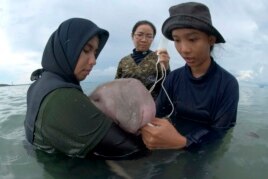23 June, 2019
A group of ocean experts has been helping a baby dugong survive off the southern coast of Thailand. Dugongs are large ocean mammals.
The experts named the baby Marium. She has developed an attachment to humans since her accidental separation from her mother. The experts hope Marium will soon be able to survive on her own.
Marium is about five months old. She has become popular on social media in Thailand since images spread of the biologists feeding her milk and sea grass.
The dugong is a kind of sea mammal similar to the American manatee and can grow to about 3.4 meters in length.
The non-profit group International Union for the Conservation of Nature lists dugongs as vulnerable.
Marium was found alone near a beach on Ko Poda island in April 2019. Officials later tried to release her into a dugong habitat near the coast of another island but she swam away.
Veterinarians and volunteers go in boats each day to find Marium near the dugong habitat off Ko Libong island. She does not swim with the dugong group. Usually, she goes immediately to the boats, then follows them to shallower water. There, the experts feed her as many as 15 times a day. They give her milk and sea grass, similar to her natural diet. The experts also examine her health.

In this Thursday, May 23, 2019, photo, officials of the Department of Marine and Coastal Resources feed milk to Marium, a baby dugong separated from her mother, on Libong island, Trang province, southern Thailand. (Sirachai Arunrugstichai via AP)
Marium's caregivers think the animal has formed a bond with humans. The experts also think she likes the shape of the bottom of the boats, possibly seeing them as a mother substitute.
Nantarika Chansue is director of the Aquatic Animal Research Center of Chulalongkorn University's Faculty of Veterinarian Science. She advises Marium's caregivers.
She said Marium is emotionally attached to her caregivers and always swims close to and stays with the boat "as if it was her mother." She added when the vets are swimming, Marium goes under their arms, as if she would with her mother.
Marium is now famous on social media and images of her bonding with her human friends have been widely shared by Thai media agencies. Crowds of people now also visit Libong island to watch her feedings.
The veterinarians say they need to continue caring for Marium for at least another year until she can be weaned from milk. After that, they hope she will be able to care for herself without their help.
Nantarika said dugongs typically stop drinking milk at around 18 months and usually spend around eight years under their mothers' care. She said Marium will have to be trained later to live without help from humans. But at this point, all attention must go toward her survival.
I'm Jonathan Evans.
Jerry Harmer and Pitcha Dagprasith reported this story for The Associated Press. Alice Bryant adapted it for Learning English. Caty Weaver was the editor.
__________________________________________________________________
Words in This Story
mammal - n. a type of animal that feeds milk to its young and that usually has hair or fur covering most of its skin
vulnerable - adj. as categorized by the IUCN: likely to become endangered unless situations threatening the species' survival and reproduction improve
habitat - n. the place or type of place where a plant or animal naturally or normally lives or grows
veterinarian - n. An animal doctor
wean - v. to start feeding food other than the animal's mother's milk
typically - adv. usually